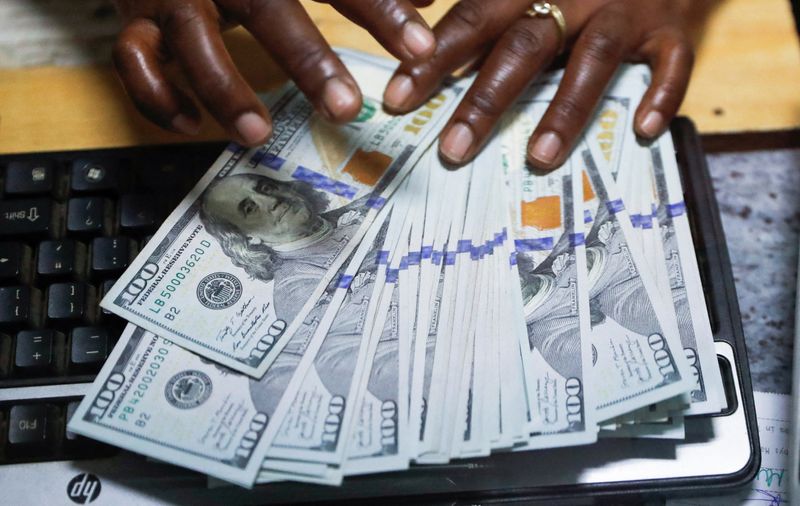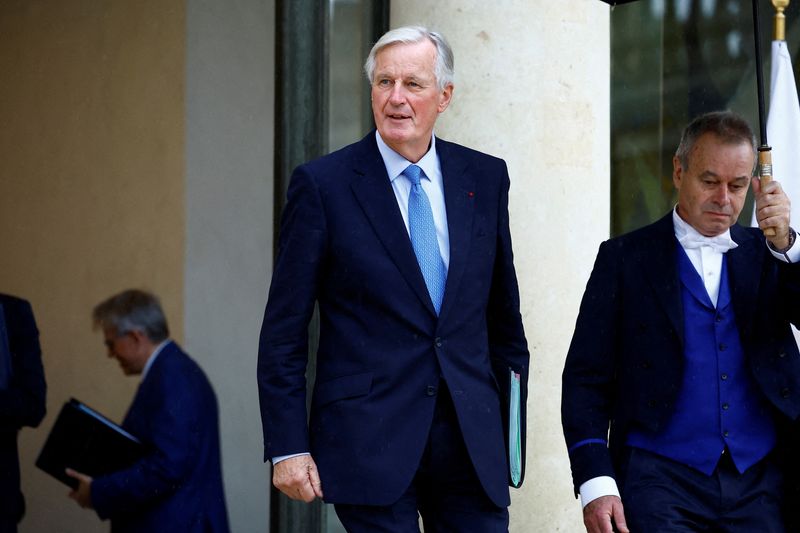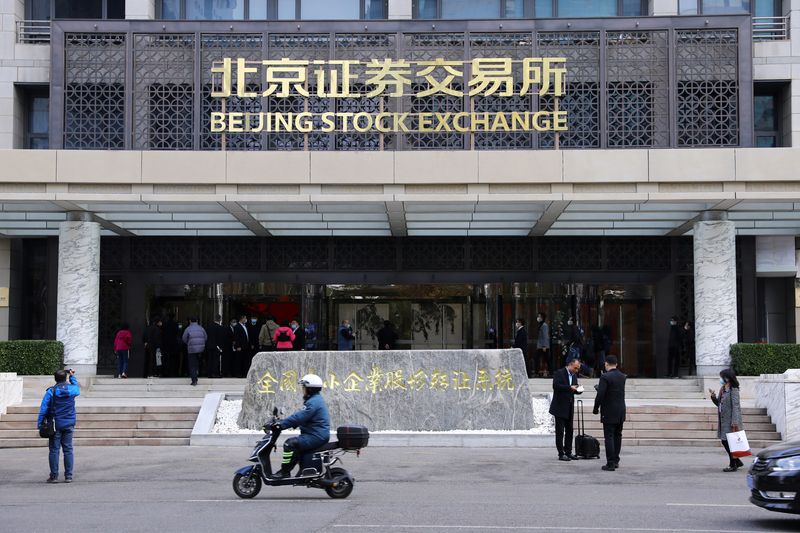Select Language

SHANGHAI/SINGAPORE (Reuters) - Chinese stocks extended a blistering rally on Monday with those in the mainland headed for their best month in almost a decade, as Beijing rolled out further stimulus measures to arrest a slowdown in the broad economy.
Benchmark indexes in mainland China began the week on a solid footing after clocking their best weekly performance in nearly 16 years on Friday, with the CSI300 blue-chip index last up more than 6.22%.
The Shanghai Composite Index jumped 5.7%, while Hong Kong's Hang Seng Index rose 3.34%.
Shares of property companies rose sharply in response to China's central bank late on Sunday saying that it would tell banks to lower mortgage rates for existing home loans before Oct. 31, as part of sweeping policies to support the country's beleaguered property market.
Adding to efforts to reverse the property downturn, Guangzhou city announced the same day the lifting of all restrictions on home purchases, while Shanghai and Shenzhen eased curbs on buying.
"The market is still surprised by China's policy support and momentum is still continuing," said Kenny Ng, strategist at China Everbright (OTC:CHFFF) Securities International in Hong Kong.
Mainland-listed property stocks advanced 6.4%, while the Hang Seng Mainland Properties Index charged 8.4% higher.
Shares of consumer staples last traded 7% higher. The smaller Shenzhen index soared 8.2%.
For the month, the CSI300 index was eyeing a gain of more than 18%, its best performance since December 2014. The Shanghai Composite Index was similarly on track to end September with a 14.8% increase, its most since April 2015.

By Satoshi Sugiyama
TOKYO (Reuters) -Japan's factory output tumbled last month driven by typhoon-led disruptions in motor vehicle production and weak U.S. sales, with the government and analysts cautioning about a subdued outlook that raises the hurdle for a solid economic recovery.
Industrial output fell 3.3% in August from the previous month, data released by the Ministry of Economy, Trade and Industry (METI) on Monday showed, worse than a median market forecast for a 0.9% drop.
"Taking into account overseas factors, it is difficult to expect a significant increase in production in the near future, and the pace of recovery will remain moderate," said Shungo Akimoto, market economist at Mizuho Securities.
Motor vehicles production dropped 10.6% in August compared to a month ago, as Typhoon Shanshan forced a swath of automakers to suspend operations, a METI official said. Automaker's certification scandals, which led to the production suspension of three models domestically, also put downward pressure on output.
Weak auto sales in the U.S. might have also dented motor vehicle output, said Takeshi Minami, chief economist at Norinchukin Research Institute.
Production machinery also fell, including a chip-making machinery down sharply by 18.7% month-on-month in August. The METI attributed the decrease to weaker overseas demand, with exports to Taiwan dropping significantly.
Although manufacturers surveyed by METI expect seasonally adjusted output to increase 2.0% in September and expand 6.1% in October, those production forecasts tend to come out stronger than the actual results.
The July-September output would be lower than the second quarter even if September output grows as anticipated, a METI official said.
"The weight on production was gradually being lifted, but there was a strong sense of uncertainty when we thought about whether we could have a bright outlook in the future," the official said.
Separate data showed Japanese retail sales rose 2.8% in August from a year earlier, above the median market forecast for a 2.3% rise.
Compared with the previous month, retail sales edged up 0.8% in August, following a 0.2% gain in July, the data showed.
Japan's economy expanded an annualised 2.9% in the second quarter as steady wage hikes underpinned consumer spending. Capital expenditure continues to grow, though soft demand in China and slowing U.S. growth cloud the outlook for the export-reliant country.

By Wayne Cole
SYDNEY (Reuters) -Asia share markets turned hesitant on Monday as strife in the Middle East offset more stimulus measures in China, while the Nikkei dived on concerns Japan's new prime minister favoured normalising interest rates.
The rush of stimulus helped outweigh a poor manufacturing survey and lift the blue-chip CSI300 another 3.0%, having already jumped 16% last week. The Shanghai Composite climbed 4.4%, on top of last week's 13% rally.
Continued Israeli strikes across Lebanon added geopolitical uncertainty to the mix, though oil prices were still restrained by the risk of increased supply. [O/R]
The week is packed with major U.S. economic data including a payrolls report that could decide whether the Federal Reserve delivers another outsized rate cut in November.
The Nikkei led the early action with a dive of 4.1% as investors anxiously waited for more direction from new Prime Minister Shigeru Ishiba, who has been critical of the Bank of Japan's easy policies in the past.
However, he sounded more conciliatory over the weekend saying monetary policy "must remain accommodative" given the state of the economy.
That helped the dollar nudge up 0.2% to 142.52 yen, after sliding 1.8% on Friday from a 146.49 top. [USD/]
"Ishiba has endorsed the BoJ's intention to normalise monetary policy, albeit leaving it uncertain as to the pace and timing," said HSBC economist Jun Takazawa.
"If additional stimulus measures are realised, this would also likely buttress the recovering trend in spending, thereby strengthening the BoJ's conviction to raise interest rates at a gradual pace," he added. "All in all, we continue to see a constructive outlook for Japan."
Over in China, the central bank said it would tell banks to lower mortgage rates for existing home loans by the end of October, likely by 50 basis points on average.
That follows a barrage of monetary, fiscal and liquidity support measures announced last week in Beijing's biggest stimulus package since the pandemic.
"We believe deflation risks are now being taken more seriously," said Christian Keller, head of economic research at Barclays. "At the same time, the Politburo suggests a consensus has likely been reached in Beijing that fiscal stimulus and central government leverage are necessary to arrest the downturn."
"This is an important shift in a market that was looking for more than just the bare minimum."
WALL ST ON A ROLL
The rally in China helped MSCI's broadest index of Asia-Pacific shares outside Japan firm 0.3%, having surged 6.1% last week to a seven-month high.
Wall Street also had a rousing week helped by a benign reading on core U.S. inflation on Friday that left the door open to another half-point rate cut from the Fed.
Futures imply around a 53% chance the Fed will ease by 50 basis points on Nov. 7, though the presidential election two days earlier remains a major unknown.
A host of Fed speakers will have their say this week, led by Chair Jerome Powell later on Monday. Also due are data on job openings and private hiring, along with ISM surveys on manufacturing and services.
EUROSTOXX 50 futures FTSE futures were little changed in early trade. S&P 500 futures were flat on Monday, while Nasdaq futures dipped a fraction. The S&P 500 index is up 20% year-to-date and on track for its strongest January-September performance since 1997.
In currency markets, the dollar index was flat at 100.41 after easing 0.3% last week. The euro stood at $1.1167 , having bounced on Friday in the wake of the benign U.S. inflation report. [USD/]
The euro zone releases its inflation figures this week, along with producer prices and unemployment. German inflation and retail sales are due later on Monday, while European Central Bank President Christine Lagarde speaks to parliament.
A softer dollar combined with lower bond yields to help gold reach record highs at $2,685 an ounce. It was last at $2,656 an ounce, and on track for its best quarter since 2016. [GOL/]
Oil prices crept higher at tensions in the Middle East offset concerns about possible increased supply from Saudi Arabia. [O/R]
Brent rose 61 cents to $72.59 a barrel, while U.S. crude gained 44 cents to $68.60 per barrel.

Investing.com -- Investors may get some indications about the size of the next Federal Reserve rate cut this week as the latest US jobs report is released and Fed Chair Jerome Powell speaks. Meanwhile, the final quarter of what has been a turbulent year so far in markets gets underway. Here's your look at what's happening in markets for the week ahead.
1. US jobs report
The Fed kicked off its rate-cutting cycle with a super-sized 50 basis point cut earlier this month, but the labor market continues to be a focal point for investors gauging how rapidly the central bank will need to cut rates in coming months.
The Labor Department is to release the October nonfarm payrolls report on Friday, with economists expecting the US economy to have added 144,000 jobs.
Investors are keen to see whether the jobs data will support expectations for a soft-landing scenario, in which the Fed tames inflation without badly impacting growth.
Weaker than expected data could revive fears over the prospect of a recession, while unexpectedly strong jobs growth may stir worries that the Fed will not cut rates as deeply as expected as it seeks to avoid an inflation flare-up.
2. Powell remarks
Fed Chair Jerome Powell is set to speak on the economic outlook before the National Association for Business Economics on Monday.
In a note dated Friday, analysts at Deutsche Bank said they expect Powell's comments to largely echo his post-meeting press conference remarks, where he justified the outsized rate cut by the confidence gained on inflation and the clear shift in downside risks, particularly to the labor market.
Investors will also get the chance to hear from several other Fed officials over the course of the week, including regional Fed presidents Bowman, Bostic, Barkin and Williams.
Ahead of Friday’s jobs report Tuesday's JOLTS report for August and Wednesday's ADP data on private sector hiring will give a broad outlook on the state of the labor market.
3, Q4 kicks off
The fourth quarter gets underway on Tuesday after a turbulent few months in markets.
August was a volatile month with the unwinding of the yen carry trade coming at almost exactly the same time that the Mag 7 tech bulls broke down and recession fears flared after a weaker than expected US jobs report.
Stocks have since rallied to fresh record highs, but the yen is about to clinch its best quarterly performance since the 2008 global financial meltdown, benchmark global borrowing costs and oil are both down almost 15% and China is opening the stimulus spigots.
The final quarter will be dominated by November's US election between Donald Trump and Kamala Harris so more volatility is likely in store.
4. Eurozone inflation
The eurozone is to release flash September inflation data on Tuesday, which will be closely watched as European Central Bank officials mull whether to cut rates again in October.
Economists are expecting the annual rate of inflation to come in at 1.9%, dropping below the ECB’s 2% target for the first time since June 2021 thanks to lower energy prices, though it's expected to rise again in the final months of the year.
Investors are now pricing in a slightly more than 50% chance of a 25 basis-point October rate cut they thought was unlikely just last week as euro zone business activity unexpectedly contracted in September, stoking fears the ECB is behind the curve.
5. Oil prices
Oil prices settled higher on Friday but fell on the week as investors weighed expectations for higher global supply against fresh stimulus from top crude importer China.
On a weekly basis, Brent settled down around 3%, while crude futures fell by around 5%.
China's central bank on Friday announced fresh stimulus measures aimed at bringing economic growth back toward this year's target of roughly 5%.
But concerns about oversupply weighed following reports that the Organization of the Petroleum Exporting Countries and its allies, together known as OPEC+, will go ahead with plans to increase production by 180,000 bpd each month starting from December.
Heightened tensions in the Middle East, raising the risk of supply disruption, continued to underpin the oil market.
Energy traders will be looking closely at labor market data in the coming days as interest rate cuts typically boost economic activity and energy demand.
--Reuters contributed reporting

By Ankur Banerjee
SINGAPORE (Reuters) -The yen slid on Friday as investors awaited results from a run-off in Japan's contest to replace its prime minister, while China's spree of stimulus measures kept risk-sensitive currencies aloft.
The yen fell more than 1% to 146.495, its lowest since Sept. 3, with markets bracing for the victory of hardline nationalist Sanae Takaichi, a vocal opponent of further interest rate hikes, in one the country's most unpredictable leadership votes in decades.
Out of a record nine-strong field, economic security minister Takaichi and former defence minister Shigeru Ishiba, amassed the most votes and qualified for the second round expected to conclude at 0630 GMT.
"If Takaichi wins and dollar/yen goes back to 160, markets might see an earlier BOJ hike or FX interventions again, although with top currency diplomat Kanda gone those might be a lot less punchy than previously," UBS analysts said in a note.
Meanwhile, China's spree of stimulus measures this week continued to boost risk appetite, lifting stocks, commodities and risk-sensitive currencies.
Steps so far have included lowering the amount of cash banks must hold as reserves by 50 basis points to free up more funds for lending and a slew of cuts in key interest rates.
Sterling was a shade lower at $1.3381 but remained close to the 2-1/2 year high it touched this week, while the Australian and New Zealand dollars also held near multi-year highs due to China stimulus plans.
The Aussie eased to $0.68705, but was near the 18-month high it touched on Wednesday. The kiwi last fetched $0.6298, not far from its nine-month high. [AUD/]
On Thursday, China's leaders pledged to support the struggling economy through "forceful" interest rate cuts and adjustments to fiscal and monetary policies, stoking expectations for more stimulus.
The remarks, which included guidance to officials to support household consumption and stabilise the troubled real estate market, came in an official summary of a monthly meeting of top Communist Party officials, the Politburo.
"It certainly appears that property and the economy have become an urgent priority for the Politburo judging by the timing of the announcements and the specific mention of fiscal measures," said Jon Withaar, who manages an Asia special situations hedge fund at Pictet Asset Management.
"We are positive on the change in language but want to see specific details to be able to make a informed decision about the efficacy of such measures."
DRIFTING DOLLAR
Data on Thursday suggested the U.S. labour market remained fairly healthy, while other reports showed corporate profits increased at a more robust pace than initially thought in the second quarter, highlighting an upbeat economic outlook.
The dollar, however, remained on the back foot as traders priced in 73 basis points (bps) of easing for the rest of the year, with a 51% chance for another outsized half-percentage-point cut, according to CME Group's (NASDAQ:CME) FedWatch Tool.
The Federal Reserve has recently signalled a shift in focus away from inflation and towards keeping the labour market healthy, delivering a larger-than-usual 50 bps interest rate cut last week.
The dollar index, which measures the greenback against a basket of currencies including the yen and the euro, was last at 100.86, not far from the 14-month low of 100.21 it touched on Wednesday.
The euro was steady at $1.11615, just below the 14-month high of $1.1214 it touched on Wednesday.
Investors will keep an eye on the personal consumption expenditures price index due to be released later on Friday, but analysts do not expect the data to materially shift market pricing for U.S. rates unless there is a huge miss.

By Elizabeth Pineau and Michel Rose
PARIS (Reuters) - It's a mess, but it might just hold.
Despite looking like the most unstable French administration in recent history, despised by the left and propped up by the far-right, Prime Minister Michel Barnier's fragile minority government may last longer than many think, lawmakers and analysts told Reuters.
That's because Marine Le Pen's National Rally party, which could join forces with other disgruntled parties to topple the government at will, has no real interest in owning an even bigger mess that might damage its presidential hopes in 2027. It also faces an awkward corruption trial due to begin in Paris next week.
Meanwhile, Barnier has sought to placate Le Pen and neutralise the far-right's power over his right-wing team by appointing ministers who share RN anger on immigration and crime, leaving Le Pen's party with less to grumble about.
The left - still irked that it won the most seats in this summer's legislative election, only to see its prime ministerial candidate overlooked for the top job - says it will issue no-confidence motions against the government but knows it doesn't have the numbers on its own for those threats to count.
Say it softly but, after months of turmoil since Macron called the snap vote, a fragile stability now prevails.
"The French don't like chaos," senior RN lawmaker and party spokesman Laurent Jacobelli told Reuters. "We are not here to cause chaos, we are pragmatic."
Pouria Amirshahi, a Green party lawmaker who was part of the leftist alliance that won the most seats in this summer's vote, said the stability of the new government was based on "a sort of resignation" on the left, and the fact that "the RN has no interest in bringing down the government right away".
"They want to calmly prepare to govern," he said. The upcoming graft trial "will prevent Marine Le Pen from accelerating the upheaval that she is calling for but which she does not really want", he added.
On Monday, Le Pen, her party and 26 other RN members will go on trial in a Paris criminal court on charges of embezzling European Parliament funds.
Le Pen and the RN have denied any wrongdoing. If they are found guilty, they could face 10 years in prison and a 1 million euro fine, while also face being barred from office for up to five years. The trial is due to last seven weeks.
Jacobelli was calm about the impact the trial could have on perceptions of the RN, but confident the party would prevail.
"Obviously, this will be discussed at a time when we would prefer to talk about the problems and the future of the French," he told Reuters.
EARLY TEST
The upcoming 2025 budget bill, which needs to reach lawmakers by mid-October at the latest, provides the first real test of Barnier's government.
It's politically toxic. New Finance Minister Antoine Armand and Budget Minister Laurent Saint-Martin must find billions of euros in spending cuts and tax increases to close a bigger-than-expected deficit.
Although discussions will be tough, especially as France is under pressure from the EU and bond markets, the RN has little reason to shut down France by blocking the bill, experts said.
"They're looking for respectability so, for them, playing a partner role in the making of the budget is very clearly part of their electoral strategy," said Christopher Dembik, an economist with Swiss bank Pictet, who believes the government will survive until summer at least.

BUENOS AIRES (Reuters) -Argentina's poverty rate soared to almost 53% in the first half of the year, official data released on Thursday showed, the first hard evidence of the painful impact of libertarian President Javier Milei's tough austerity measures.
That marked a steep jump from 41.7% at the end of last year and more than double the 26% just seven years ago, underscoring the severe cost to regular Argentines of repeated economic crises that have hammered the South American nation.
The data underscores how Milei's spending cuts, aimed at overturning a deep fiscal deficit, have caused major short-term pain. The country is in a deep recession and inflation remains in triple digits, though there are signs things are improving.
"Since this government came to power, jobs have dropped away," said Irma Casal, a 53-year-old in Buenos Aires, who works three shifts as a garbage recycler, cardboard collector and bricklayer, but still struggles to stay afloat.
"We work twice as hard for less and we have to keep going."
Agustin Salvia, director of the UCA's Observatory, said that there was a significant impact at the start of the year from Milei's policies. However, there had been signs of an improvement recently, he added.
"If you look at the whole story, it shows a deterioration in the first quarter. That situation has since started to ease," he said.
Argentina's government has cut some welfare programs and reduced support to soup kitchens, but argues that it has also expanded two key welfare programs, the Universal Child Allowance and a Food Card program, giving direct support to families.
"Any level of poverty is horrendous," presidential spokesman Manuel Adorni said in a daily press conference on Thursday, blaming mismanagement by previous governments for leaving economic "bombs" that Milei was now trying to deactivate.
"We are doing everything, everything so that this situation changes."
Milei's spending cuts have been cheered by markets and investors for helping right the state's finances after years of deficits, but have pushed the country into a recession, despite signs the economy could now be bottoming out.
The Catholic University of Argentina's (UCA) observatory had estimated the poverty rate soared to 55.5% in the first quarter of the year before easing to 49.4% in the second quarter, giving a 52% average for the first six months of this year.
'ANY LEVEL OF POVERTY IS HORRENDOUS'

By Elisa Anzolin and Mimosa Spencer
MILAN/PARIS (Reuters) -Moncler's Chairman and CEO Remo Ruffini is tightening his control of the outerwear specialist after striking a deal with LVMH, which will partner with Ruffini to fund an expanded investment in the Italian company.
The deal also strengthens French group LVMH's dominance of the global luxury sector. Milan-based Moncler, one of the industry's biggest success stories in recent years, had been seen as a potential acquisition target or merger candidate for rival luxury groups seeking to expand.
Under the deal announced late on Thursday, LVMH purchased a 10% stake in Double R, the investment vehicle controlled by the CEO's Ruffini Partecipazioni Holding, which currently has a 15.8% stake in Moncler.
Double R will increase its stake in Moncler up to 18.5% over the next 18 months, thanks to the funding provided by LVMH that will increase its investment in Double R up to 22%, Ruffini Partecipazioni Holding and LVMH said in a statement.
Over the last nine months, two investors in Double R had exited the vehicle and were paid with Moncler shares, which had reduced Ruffini's control of the company.
The partnership with LVMH will reinforce Ruffini's position as the largest shareholder of Moncler, the companies said.
LVMH will gain the right to appoint two board members to Double R, solely controlled by Ruffini, as well as a director on Moncler's board.
Investors have grown jittery about a slowdown in the luxury sector, particularly weakness in the key Chinese market, hit by slowing economic growth and a property crisis.
But Moncler has proven resilient, with 11% revenue growth in the first half of the year, thanks to double-digit growth in Asia.

By Jamie McGeever
(Reuters) - A look at the day ahead in Asian markets.
Will this week be Chinese President Xi Jinping's equivalent of Mario Draghi's famous "whatever it takes" moment?
Only time will tell if China's volley of monetary, liquidity and fiscal stimulus shots this week sparks a sustainable economic recovery, but the rally ripping through Chinese stocks suggests investors are willing to give Beijing the benefit of the doubt.
At the very least, downside risks to growth and inflation have been pared back. Remove the near-term pessimism, and the outlook is suddenly a lot brighter, regardless of the underlying fundamental and structural challenges China's economy faces.
Couple that with a U.S. economy still seemingly on track for a 'soft landing' and a central bank determined to get ahead of the curve to deliver that outcome, the global picture is a lot brighter too.
Risk assets around the world are responding accordingly. The MSCI World and S&P 500 both hit new highs on Thursday.
In Asia, Shanghai's blue chip equity index is up 10.8% so far this week, which would be its biggest weekly rise since December, 2014. The broader Shanghai composite index is up 9.7%. A close at that level on Friday would mark its best week since November, 2008.
Hong Kong's benchmark Hang Seng index's 4% rally on Thursday brings its weekly gains to 9%, the most in 13 years. An index of mainland Chinese property stocks, meanwhile, leapt 16%.
The main potential brake on this momentum on Friday will be a wave of profit-taking ahead of the weekend, especially as it is coming up to the end of the quarter, and Chinese markets will be closed Oct. 1-7 for the Golden Week holiday.
While the euphoria and relief are understandable given how beaten down sentiment and asset prices were, a sense of caution is warranted.
Although Draghi's "whatever it takes" commitment in 2012 to save the euro greatly reduced the risk of financial and political catastrophe - bond yield spreads have been lower ever since - the actual policies behind it didn't fundamentally solve the euro zone's severe economic problems.
Similarly, Beijing's measures this week won't fully solve China's property bust, banish the threat of deflation, or address its long-term demographic challenges.
But that's for another day. Or year.
The main Asian economic indicator on deck on Friday is Tokyo consumer price inflation for September, which is expected to show a fairly sharp slowdown in the annual core rate to 2.0% from 2.4%.
Minutes from the Bank of Japan's July meeting on Thursday showed that policymakers were divided on how quickly interest rates should be raised again, highlighting uncertainty on the timing of the next increase in borrowing costs.
Here are key developments that could provide more direction to Asian markets on Friday:
- Tokyo inflation (September)
- Japan leading indicators (July)
- German unemployment (September)

Investing.com -- Wells Fargo now forecasts that China's economy will grow 4.6% in 2024, a downgrade from the earlier estimate of 4.8% and below the government's official 5% target.
The bank’s economists believe that despite recent policy support from Chinese authorities, these measures are not sufficient to address the deeper structural challenges faced by the economy. They highlight that China’s growth remains hampered by a subdued property market, weak domestic consumption, and deflationary pressures, with consumer confidence remaining low.
Chinese policymakers have introduced several measures aimed at shoring up the property sector and stimulating growth, including lowering lending rates and reducing the reserve requirement ratio for major banks. Yet, according to Wells Fargo, these policies are unlikely to significantly change the economic trajectory.
“Directionally speaking, easier monetary policy and support for the property sector is an appropriate course of action; however, we believe the recent announcements are not a cure for China's growth challenges,” economists said in a note.
“As far as property sector support, we believe Chinese consumers are unwilling to direct capital toward real estate at the current juncture, given the sharp and ongoing downturn in the industry,” they added.
Further complicating the economic outlook is China’s monetary policy. Wells Fargo points out that the People’s Bank of China (PBOC) has been in easing mode for some time, but these actions have not been able to ignite economic activity.
Specifically, real interest rates in China remain positive and restrictive. Economists said the "gradual easing of monetary policy that maintains restrictive monetary policy settings will continue to act as a drag on China's economy for the time being.”
In terms of fiscal policy, Wells Fargo notes the limited role it has played in recent years. While China deployed substantial fiscal stimulus in past crises, such as during the Global Financial Crisis, fiscal support has been relatively absent in the post-COVID era.
The report suggests that Chinese authorities may be hesitant to increase fiscal stimulus due to the country's high debt burden and concerns that households would opt to save rather than spend any stimulus, particularly in the current deflationary environment.
Looking ahead, Wells Fargo expects China’s economic growth to slow further in 2025, forecasting a modest 4.3% growth rate.

